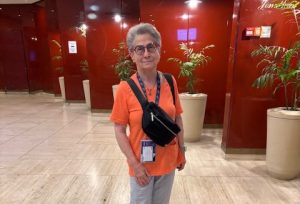 As a kid, movie director Jacob Medjuck spent 14 summers at Nova Scotia’s Camp Kadimah, tasting, as he is fond of saying, “all 31 flavours of life” from “happiness” to “loserdom.”
As a kid, movie director Jacob Medjuck spent 14 summers at Nova Scotia’s Camp Kadimah, tasting, as he is fond of saying, “all 31 flavours of life” from “happiness” to “loserdom.”
Jacob Medjuck and an actor on the set of Summerhood
Now, in his first feature film, Summerhood, which is scheduled to end its three-week run in Toronto on Nov. 25, Medjuck playfully resurrects the joys and misadventures of adolescence in a summer camp setting.
Shot in Camp Kadimah over a 31-day period, Summerhood – the winner of the 2008 Atlantic Film Festival’s audience award – is described by the Globe and Mail as “an earnest effort from a first-time director who clearly enjoys stoking and poking at his campfire memories.”
Summerhood, starring an unknown but feisty cast, is really an adaptation of his own childhood experiences, says Medjuck, a classical animator by training and a former stand-up comedian.
As he put it, “I wanted to make a sweet comedy about the horrors of being a child.”
Half jokingly, he added,”I went to camp with dozens of lunatics and distilled the poignant stuff into the script.”
Medjuck, 34, knew what he had to avoid in making this film. “The colourless Leave It To Beaver image of youth is false, misleading and, worse, boring. I felt that the emotionally neutered representations of childhood, as portrayed for decades in movies and TV, are insulting to the authentic traumas of actual teens.”
Medjuck, a onetime CJN humour columnist who worked for eight years as an animator for such name-brand companies as Dreamworks, Walt Disney, Sony, Fox and Warner Brothers, was thrilled that he could film Summerhood at Camp Kadimah.
“It’s an absolutely stunning site. Since it was my childhood summer camp, the time I spent filming there was extra special.”
But in a rueful aside, Medjuck acknowledged that weather conditions weren’t exactly ideal as the shoot wound down.
“It snowed on the last day,” he said. “October can be a ruthless time to make a summer film in Canada.”
Compared to the difficulties of raising funds for Summerhood, the inclement weather was hardly a problem.
“The film cost a lot more than we could pay for,” he explained. “I went door to door, like a girl scout, for two years pitching the merits of this investment.”
He asked potential investors two major questions. “Did you go to camp? Was it fun?” Then he said, “Our film is all about that.”
Forty four investors finally came through, but even then, it was a touch-and-go venture. “Our very last frame of film ran through the camera during the last take,” he recalled.
He muddled through thanks to three factors: a talented cast, luck and blind ambition.
“It worked out,” he said.
Medjuck, however, realized he was courting disaster by working with kids.
“Even the most seasoned filmmakers are told to avoid children, animals and remote locations, all of which are the Bermuda Triangle of a production. With little heed, I embraced all three and rode the shoot into the ground until I got everything on film. It was wild.”
The bumpy roller coaster ride taught him a valuable lesson.
“Show business is 96 per cent business, but if the four per cent ‘show’ part isn’t captivating, the business part has no value.”
Working with five casting directors in Toronto, Montreal, Halifax, Vancouver, Los Angeles and Chicago, Medjuck auditioned 4,000 kids for a handful of roles.
“I saw amazingly talented kids for whom we had no part in the film. We picked five leads and packed them around a seder table of crazies.”
When one of the actors quit at the last moment, Medjuck, ever the trooper, filled in for him.
Medjuck’s road to feature films began when he came to the realization that animation could not accommodate all his budding, bubbling ideas.
In retrospect, his transition from animation to live action was not as drastic as he might have imagined.
Once it dawned on him that the principles of story, visualization, pacing, comedy and drama are universal, he was well on his way.
“I was confident that Summerhood could be heartfelt and entertaining. I knew it could be made. I just had no idea how it would come together.”
Medjuck has taken a long and circuitous path to the film industry.
Born and raised in Halifax, the son of a lawyer and an educator, he studied mechanical engineering and visual arts on full scholarship at the University of Western Ontario.
To an outsider, it may seem like an odd combination, but to Medjuck it was a great fit.
“I have always loved science and art. In junior high school, my partner and I won the silver medal at a national science fair. The following year, we captured the gold medal.
“But I always wanted to be an animator. As a child, I would make stop motion animations with our home video camera.”
Having almost finished his undergraduate degree, he moved to Vancouver to train in animation. “I knew I was never going to be an engineer. I just stayed because I loved the challenge.”
Medjuck’s first job in animation was on the Fox TV show Ned’s Newt. While working as an animator, he performed as a stand-up comedian at Yuk Yuk’s in Toronto and took a role in a short horror film, Tall Tale Heart, for which he won a best acting award at the 2005 Shockerfest International Film Festival.
These gigs were helpful when he made Summerhood. “I knew I had the qualities to write and produce a movie that would connect with an audience.”
The future appears promising for Medjuck.
“I’ve just sold two animated features, and I’m planing to develop a live action script.”
Medjuck, a resident of Vancouver for the past 13 years, plans to relocate to Los Angeles, the hub of the film industry, very soon.
“I have to move to L.A. so I can get work in Canada! Crazy.”






